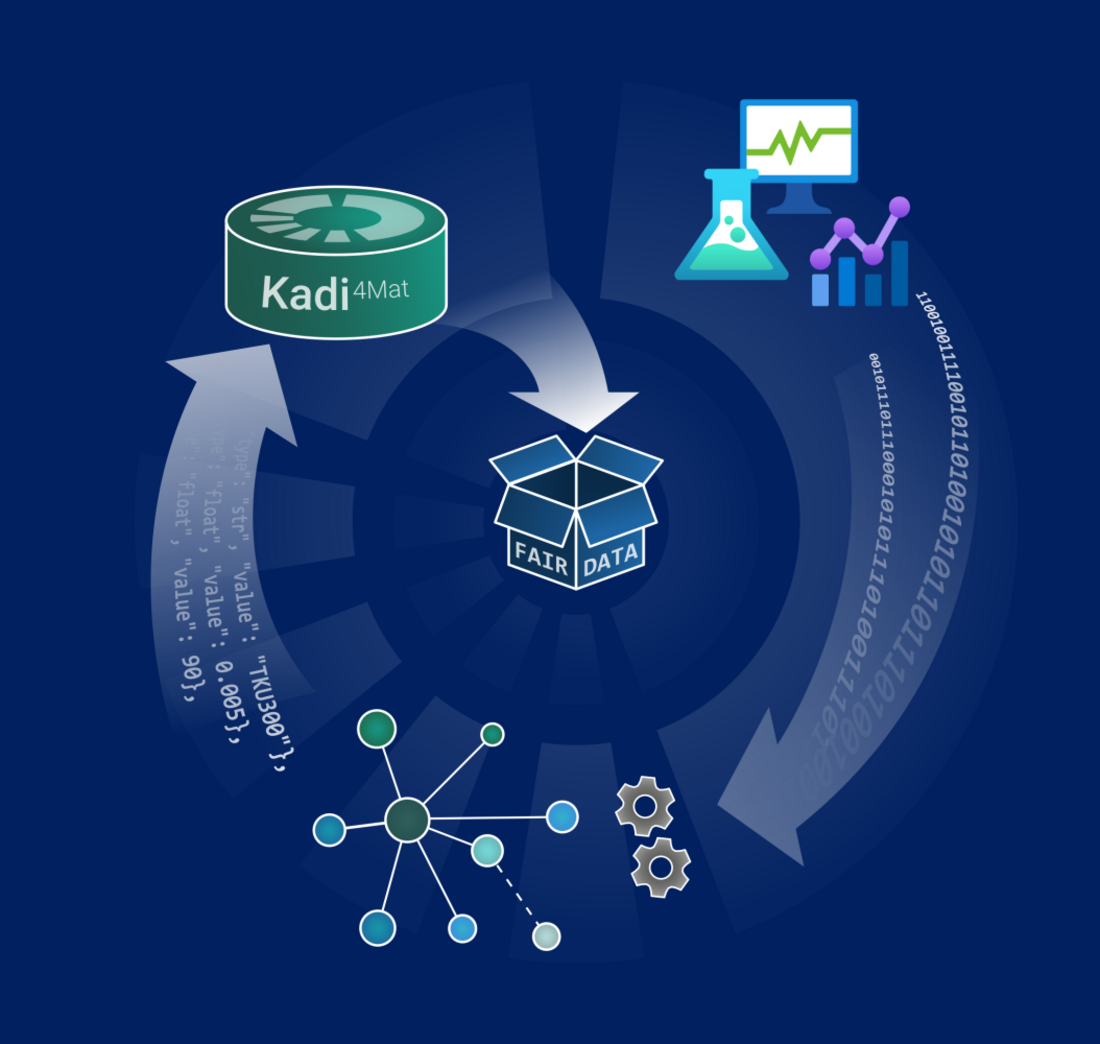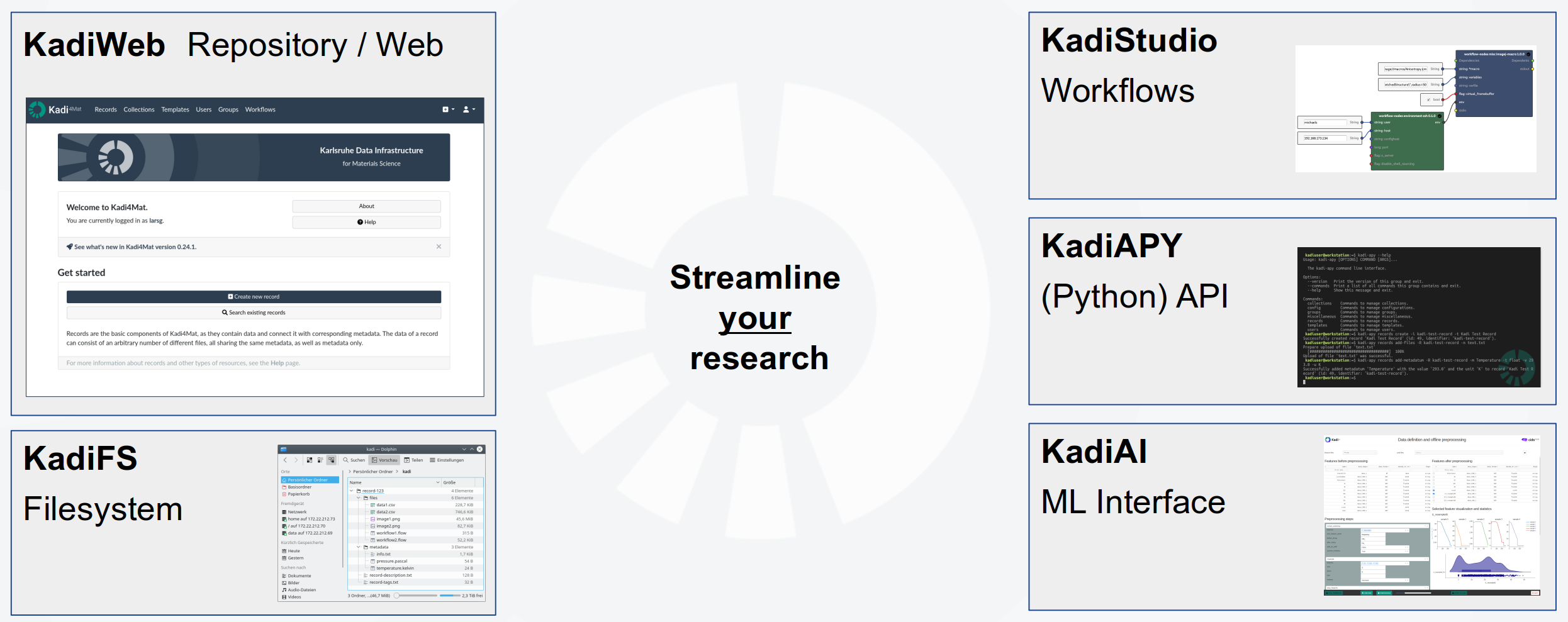Research Data Management

FAIR Research Data Management with Kadi4Mat
Research Data Management (RDM) has become a pivotal topic at the intersection of scientific research and administrative operations. Advocates highlight the enormous potential of untapped raw data and the possibilities enabled by modern analysis techniques, including machine learning and artificial intelligence. These data science methodologies increasingly complement traditional experimental, theoretical, and numerical approaches, driving a paradigm shift in how scientific research is conducted and utilized.
Critics, however, often express concerns about the perceived increase in workload and the potential for a chaotic influx of unmanageable data. Despite these challenges, RDM is recognized for its capacity to enhance research efficiency, integrity, and collaboration. Funding agencies, such as the DFG (German Research Foundation), BMBF (Federal Ministry of Education and Research), and the EU, now often require detailed RDM plans as part of grant applications, underscoring the importance of systematic data handling.
Implementing FAIR Principles
The FAIR principles provide a framework to ensure that research data are well-managed and valuable over the long term. However, implementing these principles in everyday practice can be challenging, particularly in fields without established data standards. In engineering and interdisciplinary sciences, the heterogeneity of research outputs complicates the creation of uniform standards.
Kadi4Mat addresses these challenges by developing flexible and user-centric solutions that foster a bottom-up approach to RDM. This method empowers researchers to create adaptable workflows and data management practices that align with their specific needs and disciplinary requirements. By focusing on accessibility, Kadi4Mat ensures that RDM systems are user-friendly and capable of integrating seamlessly into researchers' daily activities, thus supporting data sharing and enhancing the overall research process.

The Kadi Ecosystem: A Comprehensive RDM Solution
The Kadi ecosystem, with Kadi4Mat at its core, offers an integrated suite of tools designed to support the entire lifecycle of research data. This ecosystem combines functionalities of electronic lab notebooks (ELNs), data repositories, and advanced data analysis tools. It provides a holistic infrastructure that caters to the diverse requirements of scientific and technical disciplines.
Key Components of the Kadi Ecosystem:
- KadiWeb and KadiFS: These interfaces provide intuitive access to the repository. Through web browsers or file managers, users can easily search, tag, and link datasets, making data findable and accessible. The incorporation of dashboards for data visualization and workflow management enhances user experience and operational efficiency.
- KadiStudio: As an ELN 2.0, KadiStudio focuses on automating the research process. It allows users to digitally plan and execute research workflows, integrating user inputs, simulations, and instrumentation control. This automation fosters reproducibility and efficiency, making it easier to manage and reuse data across multiple projects.
- KadiAPI and KadiAPY: These programmatic interfaces support automated interactions between workflows and the repository, facilitating integration with external tools and systems. They ensure interoperability, allowing seamless data exchange and process coordination within and beyond the Kadi ecosystem.
- KadiAI: This component leverages machine learning (ML) and artificial intelligence (AI) to enhance data analysis capabilities. By embedding ML methods into workflows, KadiAI enables the systematic generation of new insights and optimizes research processes. It also documents metadata and data provenance, ensuring that ML projects are reproducible and transparent.
Further information can be found at the website https://kadi.iam.kit.edu/.

Enhancing Research through Automation and Interoperability
The adoption of Kadi4Mat and the Kadi ecosystem involves an initial investment of time and effort to adapt existing workflows and practices. However, this investment is offset by the substantial benefits of automation and streamlined RDM. Traditional ELNs often focus on replacing manual lab notebooks, simplifying data uploads, descriptions, and storage. Kadi4Mat extends this concept by automating the entire research process, from planning to execution and data management.
This approach significantly reduces the burden of manual data handling and enhances the reproducibility and efficiency of scientific research. Through the integration of specialized systems and open interfaces, Kadi4Mat supports a broad range of user requirements, allowing researchers to leverage their preferred tools while benefiting from the robust infrastructure of the Kadi ecosystem.
Building a Collaborative and Scalable RDM Framework
Kadi4Mat's development is driven by a collaborative effort between domain-specific researchers and data scientists. This partnership ensures that the platform evolves to meet the practical needs of technical research while advancing the field of data science. The Kadi ecosystem has grown to include various complementary systems that can be used in conjunction or independently, providing flexible and scalable solutions for different research contexts.
Kadi4Mat and the Kadi ecosystem represent a forward-thinking approach to research data management, combining user-centric design with advanced automation and interoperability. By supporting the entire research data lifecycle and facilitating seamless integration with specialized tools, Kadi4Mat empowers researchers to manage their data efficiently, collaborate effectively, and drive scientific innovation.
